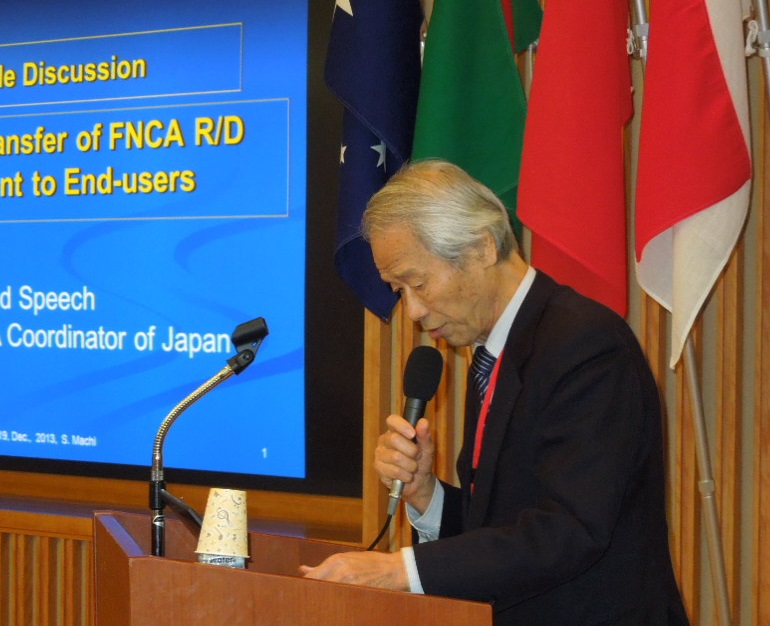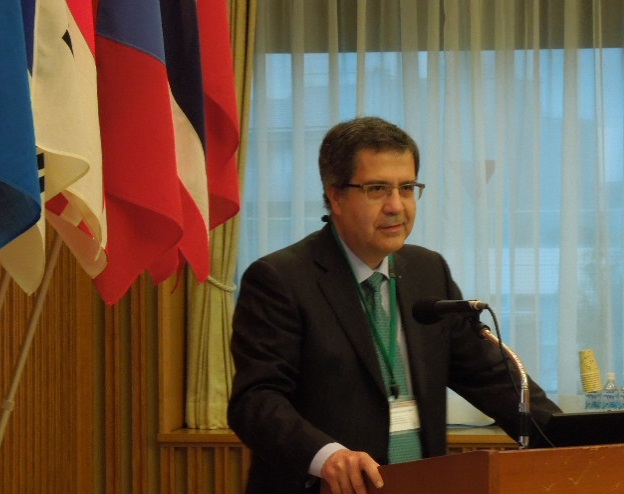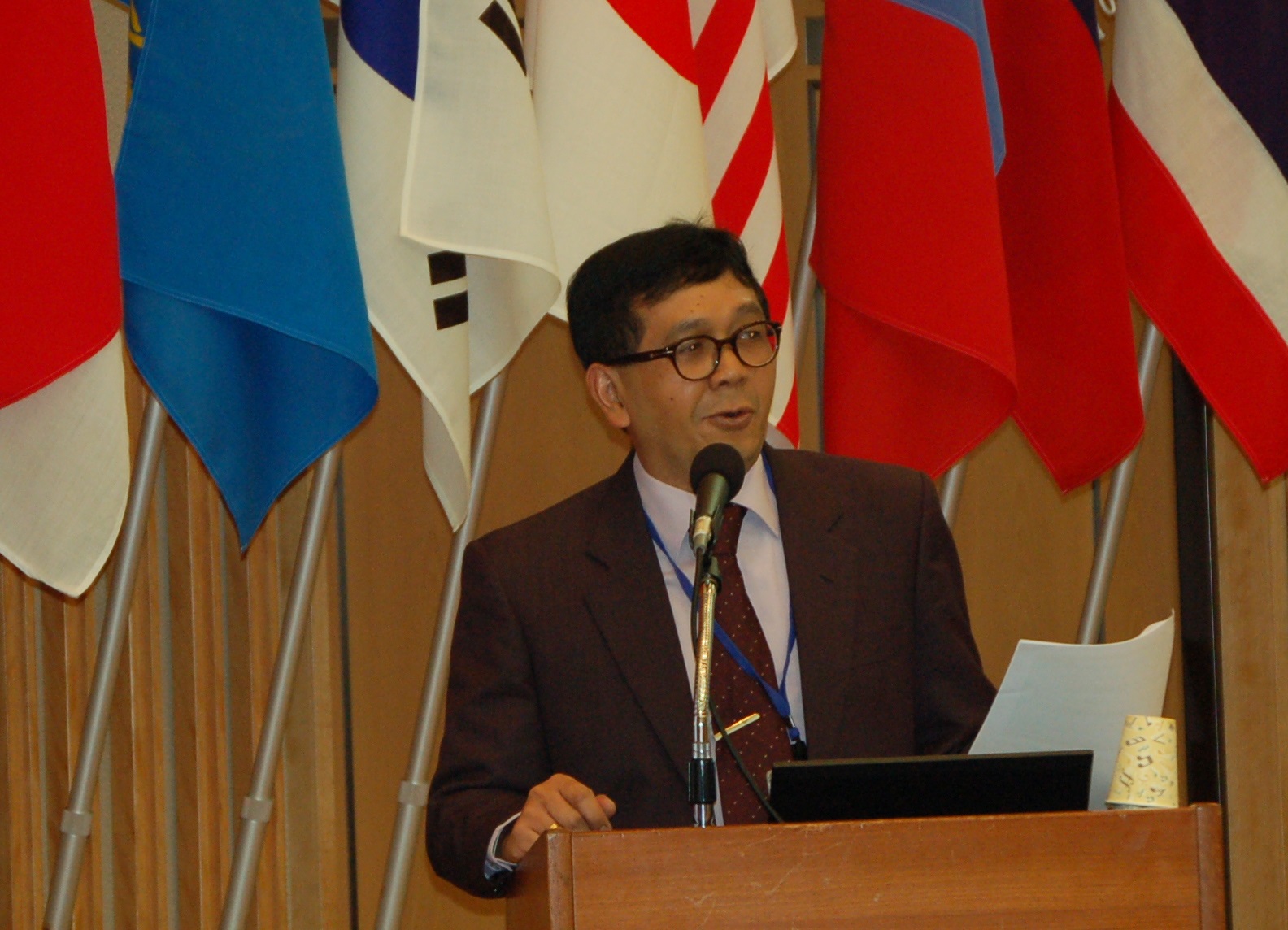Meeting Summary of the 14th FNCA Ministerial Meeting
The 14th FNCA Ministerial Level Meeting (MM), which was organized by Japan Atomic Energy Commission (JAEC) and the Cabinet Office of Japan (CAO), was held at Mita Conference Hall, Tokyo on December 19, 2013.
The meeting was attended by ministerial level representatives (including two ministers and three vice ministers) from twelve member countries i.e., the Commonwealth of Australia, the People's Republic of Bangladesh, the People's Republic of China, the Republic of Indonesia, Japan, the Republic of Kazakhstan, the Republic of Korea, Malaysia, Mongolia, the Republic of the Philippines, the Kingdom of Thailand, and the Socialist Republic of Viet Nam. (Program)(Participants List)
The Hon. Mr. Ichita YAMAMOTO, Minister of State for Science and Technology Policy, CAO, delivered welcoming remarks, in which he expressed welcome to all the participants and stated the prospect of nuclear development in Japan including TEPCO's Fukushima Daiichi Nuclear Power Station Accident response.
This was followed by self-introduction of the Heads of the Delegations and the rendering by Mr. Takashi NAKANO, chair of the Senior Officials Meeting (SOM), of the summary report of SOM.

The Hon. Mr. Ichita YAMAMOTO
Minister of State for Science and Technology Policy, CAO |

A scene of the Meeting |
In Session 2, each of twelve head of delegations delivered their country report, focusing on national nuclear energy policy, nuclear regulatory system, status and plans of research, development and utilization of nuclear energy and international cooperation, and expectation to FNCA activities. The reports confirmed that each country has been striving to achieve a vigorous progress in various areas of peaceful use of nuclear energy, i.e. application of radiation and radioisotopes and nuclear power generation.
In most countries radiation and radioactivity are actively applied in the areas of science, engineering, agriculture, industry, and medicine, and the government is fully committed to a wider and deeper utilization of radiation and radioisotopes.
Most countries expressed their view that nuclear power was one of the important electricity sources that can satisfy increasing demand for electricity, energy security and suppression of greenhouse gas emission at present or in the future even after the Fukushima Daiichi accident.
At the same time most reported that they were experiencing difficult time in political arena owing to the negative impact of the accident upon public opinion and were taking cautious attitude toward the introduction of or the increase in the nuclear power generation, paying due attention to the need for the increased assurance of safety of nuclear power plants.
In Session 3, Dr. Sueo MACHI summarized major achievement of FNCA projects to apply radiation and radioisotope for neutron activation analysis, mutation breeding, production of bio-fertilizer, medical care and preprocessing of natural polymers as well as those to build infrastructure for nuclear safety and security and develop human resources necessary for these activities. Then he introduced the suggestion of the FNCA coordinator meeting held in March this year that FNCA coordinators should organize an annual meeting of project leaders so that they share the current status of each projects and the policy and direction decided by the ministerial-level meetings of FNCA.
Dr. Akira OMOTO reported the summary of the study panel held in August 2013. He introduced that in the study panel the participants discussed the current status of Fukushima Daiichi and new regulation rules adopted by the Japanese nuclear safety regulator NRA, the opportunities and challenges of small and medium reactor (SMR) and its technology development, emergency preparedness and responses (EPR), nuclear security and stakeholder involvement. He concluded his report with recommendations to the ministerial meeting on a list of topical areas for future study panels and a proposal to start the effort for materializing regional cooperation in EPR in cooperation with the IAEA-ANSN.
In Session 4, the meeting had a presentation by Mr. Hironori NAKANISHI of METI, Japan, on the current status of decommissioning activities at TEPCO's Fukushima Daiichi that were defined in the mid- and long-term decommissioning roadmap. The meeting recognized that the current situation was very complex, and that there were still some very challenging issues such as contaminated water management, nuclear fuel removal, and fuel debris removal, though the first milestone in the roadmap, the start of the removal of used and unused fuel from spent fuel pool of unit 4 was accomplished on schedule. At the same time, the meeting recognized that the Government of Japan and TEPCO had increasingly adopted more proactive attitude and approaches towards addressing the many difficulties at the site, including the rapid and transparent information dissemination to the public and the announcement of request for information and wisdom as to the way to tackle these tasks to the international community. The chairman concluded the session with the recognition of the importance of learning lessons from the accident for the improvement of nuclear power technology.

Dr. Akira OMOTO
Professor of
Tokyo Institute of Technology |

Mr. Hironori NAKANISHI
Director-General for Energy and Technological Policy, Ministry of Economy, Trade and Industry |
Session 5 was a round table discussion entitled "Effective Implementation of Projects Outcomes and Building Relationships with End-users." Dr. MACHI discussed in the first lead speech major challenges in building networks between the nuclear application R&D institutes and end-users for the practical use of FNCA project outcomes. He also proposed ways and means to establish links for commercial application of FNCA technology such as setting the coordination committee composed of the ministries and agencies concerned involving end-users sector.
On the other hand, Dr. Alumanda DELA ROSA of the Philippines, the speaker of the second lead speech stressed the effectiveness of direct interaction between researchers and the end-user for a successful technology transfer under the condition that government provides researchers the enabling environment for technology transfer.
The meeting exchanged the experiences and practices in the technology transfer in member countries and the chairman concluded the round table, stressing the importance of continuing the effort to disseminate information utilizing diverse information channels.

Dr. Sueo MACHI
FNCA Coordinator of Japan |

Dr. Alumanda DELA ROSA
Director of
Philippine Nuclear Research Institute |
Session 6 was a round table discussion entitled "Nuclear Security Culture Development." The speaker of the first lead speech Mr. VIDAL of the IAEA gave the meeting an overview of political environment for nuclear security, the recognition of the essential roles of nuclear security culture and a list of the key challenges in developing nuclear security culture. Then Dr. Wisunubroto of Indonesia reported the experience of assessing nuclear security culture in National Nuclear Energy Agency of Indonesia (BATAN), particularly in the three research reactors sites. His report included important lessons to be learned for developing nuclear security culture in various nuclear organizations. The meeting exchanged experiences and practices for security culture development in each countries and Japan introduced activities to support nuclear security culture development in Asian countries through ISCN such as training courses and a seminar co-sponsored with IAEA. It was also announced to offer the FNCA website for introducing good practices of nuclear security culture. The roundtable concluded with the recognition that the key for the development was the recognition of the top management of organizations concerned that the threat is real and the security is important, and that FNCA should provide opportunity for member countries to exchange information about the national activities for developing nuclear security culture.

Mr. Carlos Torres VIDAL
Head of Prevention Section in the Office of Nuclear Security, Department of Nuclear Safety and Security, International Atomic Energy Agency |

The Hon. Prof. Dr. Djarot Sulistio WISNUBROTO
Chairman of National Nuclear Energy Agency of Indonesia |
In Session 7, the meeting discussed the future actions of the FNCA based on the recognition of the progresses identified in the meeting and adopted a resolution on the future courses of the FNCA that reflected the sense of the meeting that let's work hard to come up something really good for all as the FNCA activities were useful and provided the opportunity not only for mutually beneficial cooperation but also for mutually beneficial learning of greater insight into the very important socio-economic as well as scientific and engineering subjects related with the peaceful use of nuclear energy in the region (Resolution).
In Session 8 for closing, Australia reported that they were in the process of confirming the acceptance to host 15th Ministerial-Level Meeting. The meeting was officially closed with The Hon. Mr. Ichita YAMAMOTO's "Chair's Statement" and closing remarks (Chairs Statement).
|
